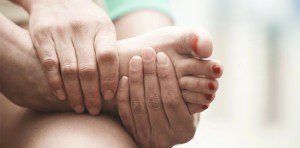 Foot Pain
Foot Pain
Each day, a great deal of pressure is placed on your feet. The average person walks between 7,500 to 10,000 steps per day, and the force placed on your feet with every step is two to three times your body weight. Your feet have more than 100 muscles, ligaments and tendons, 26 bones and 33 joints. That’s a lot of components for such a small limb that tolerates so much weight. In this complex body part, many things can cause foot pain. And if you’ve ever experienced pain in your feet, you know that there is little else you can concentrate on.
What causes foot pain?
The causes of foot pain are vastly numerous and depend on your specific circumstances. Consulting a physician or podiatric specialist is the best decision for a proper diagnosis and a successful treatment outcome. The following are a few of the most common issues that can cause foot pain.
Bunions
More women than men experience the painful boney growth on their big toe, known as a bunion, or Hallux Valgus. One of the main causes of a bunion is from wearing shoes that are too tight, too narrow or too high. All of this causes pressure on your toe joint, which in turn starts to ache, become fluid filled and can have boney growths.
Uniquely, bunions can also be hereditary and run in families, especially in females, generation after generation. These painful, red, boney, growths can also be caused by a form of arthritis.
There are several options for relieving bunion pain:
• Wear wider more confortable shoes
• Use foam or gel pads
• Try stretching exercises
• Surgery to remove the growth
Gout
Too much uric acid being built up, and then circulating as bodily waste in the blood stream causes gout. It creates tiny needle-shaped crystals that accumulate in the joints and cause excruciating painful swelling. Although gout can cause pain in many parts of the body, often, the first symptom of gout is usually pain and swelling of the toe joint.
Common things that can trigger a flare-up of gout:
• Alcohol
• Stress
• Certain medications
• Foods high in Purines (Shellfish, organ meat, sugar)
Symptoms of gout:
• Burning, Tingling in the joint
• Joint stiffness
• Joint swelling and soreness
There are many diets and medications that can help alleviate the painful side effects of gout.
Plantar fasciitis
As mentioned above, the foot is comprised of many different bones, joints, tendons and ligaments these include the plantar fascia. The plantar fascia is a band of tissue similar to ligaments. It stretches from the heel of your foot to the middle, and it is responsible for supporting your arch.
This is one of the most common foot issues; in fact, one in ten people will experience plantar fasciitis at some time in their life. Usually the pain is concentrated in the heel area, and it is normally caused by tiny injuries that occur over a long period of time.
There are many treatment options that you can do at home with the guidance of your podiatrist. This area of the foot in particular takes a long time to heal on its own, so good home care is the key to getting your foot health back to normal.
Hammer Toe
When the muscles in your toes get out of balance, they can start contracting into a claw like position. This causes the toe to bend in an upward position in the middle joint of the toe. When this happens, it can create severe pain. Hammertoe can be genetic and many times occurs in people with either a high arch or a flat foot. Various forms of arthritis can contribute to this issue as well. And unfortunately, ill-fitting footwear can also cause hammertoe, due to pushing the toes out of their normal position for long periods of time.
Treatment options for hammertoe:
• Padding the toe
• Wearing more comfortable shoes
• Out patient surgery (This involves redirecting the lower tendons of the toe to the top of the toe to help straighten it into the correct position)
Collier Podiatry
Dr. Michael Petrocelli has been practicing podiatric medicine for well over 20 years. He is an expert in his field and a leader to his peers. If you are experiencing any foot pain or foot conditions, please contact Collier Podiatry at (239) 775-0019, or visit their website at www.collierpdiatry.com
Their kind and well-trained staff are ready to answer your questions and concerns and get you back on your feet again.
Collier Podiatry, P.A.
Michael J. Petrocelli
D.P.M., F.A.C.A.S., C.W.S.P.
239-775-0019
www.collierpodiatry.com









